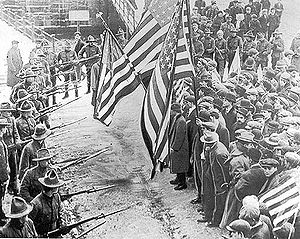Lawrence textile strike
| 1912 Lawrence textile strike | |||
|---|---|---|---|

Massachusetts militiamen with fixed bayonets surround a group of strikers
|
|||
| Date | January–March 1912 | ||
| Location | Lawrence, Massachusetts | ||
| Goals | 54-hour week | ||
| Methods | Strikes, Protest, Demonstrations | ||
| Parties to the civil conflict | |||
|
|||
| Lead figures | |||
|
|
|||
| Arrests, etc | |||
|
|||
The Lawrence textile strike was a strike of immigrant workers in Lawrence, Massachusetts, in 1912 led by the Industrial Workers of the World (IWW). Prompted by a two-hour pay cut corresponding to a new law shortening the workweek, the strike spread rapidly through the town, growing to more than twenty thousand workers and involving nearly every mill in Lawrence.
The strike united workers from more than 40 different nationalities. Carried on throughout a brutally cold winter, the strike lasted more than two months, defying the assumptions of conservative trade unions within the American Federation of Labor (AFL) that immigrant, largely female and ethnically divided workers could not be organized. In late January, when a bystander was killed during a protest, IWW organizers Joseph Ettor and Arturo Giovannitti were arrested on charges of being accessories to the murder.
IWW leaders Bill Haywood and Elizabeth Gurley Flynn came to Lawrence to run the strike. Together they masterminded its signature move, sending hundreds of the strikers' hungry children to sympathetic families in New York, New Jersey, and Vermont. The move drew widespread sympathy, especially after police stopped a further exodus, leading to violence at the Lawrence train station. Congressional hearings followed, resulting in exposure of shocking conditions in the Lawrence mills and calls for investigation of the "wool trust." Mill owners soon decided to settle the strike, giving workers in Lawrence and throughout New England raises of up to 20 percent. Within a year, however, the IWW had largely collapsed in Lawrence.
The Lawrence strike is often referred to as the "Bread and Roses" strike. It has also been called the "strike for three loaves". The phrase "bread and roses" actually preceded the strike, appearing in a poem by James Oppenheim published in The Atlantic Monthly in December 1911. A 1916 labor anthology, The Cry for Justice: An Anthology of the Literature of Social Protest by Upton Sinclair, attributed the phrase to the Lawrence strike, and the association stuck. "Bread and roses" has also been attributed to socialist union organizer Rose Schneiderman.
...
Wikipedia
